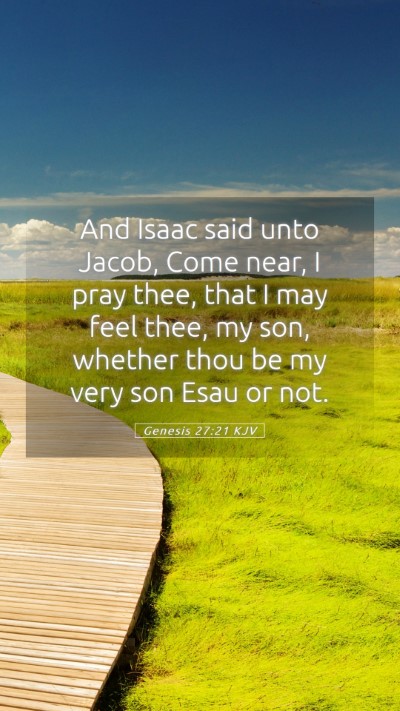Understanding Genesis 27:21
Bible Verse: Genesis 27:21 - "And Isaac said unto Jacob, Come near, I pray thee, that I may feel thee, my son, whether thou be my very son Esau or not."
Genesis 27:21 is a pivotal verse in the narrative of the blessing of Isaac. This verse illustrates the moment when Isaac, deceived into thinking Jacob is Esau, seeks to confirm the identity of his son. The meaning of this verse extends beyond the immediate storyline, offering insights into family dynamics, deceit, and the fulfillment of divine prophecy.
Commentary Insights
This verse has garnered attention from several respected public domain commentators, including Matthew Henry, Albert Barnes, and Adam Clarke. Each offers an interpretation that sheds light on the text.
Matthew Henry's Commentary
Matthew Henry notes that Isaac's request to “come near” signifies a desire for close inspection and confirmation. He emphasizes the blind nature of Isaac, both physically and metaphorically, suggesting that this blindness represents a lack of spiritual insight. Henry highlights the importance of truth in family relationships and the moral implications of Jacob's actions.
Albert Barnes' Commentary
Albert Barnes focuses on the significance of Isaac’s doubt. He discusses the tension in the narrative, examining Isaac's fears about being deceived and how this reflects a deeper struggle in human relationships. Barnes also points to God’s overarching plan, suggesting that even human deception serves to fulfill divine purposes.
Adam Clarke's Commentary
Adam Clarke provides a historical context to the verse. He elaborates on the cultural nuances of blessings in ancient times, emphasizing their significance in familial lineage and inheritance. Clarke's analysis reveals the weight of Isaac's blessing, suggesting that it was not merely a formality, but rather a profound declaration affecting the lives of both Jacob and Esau.
Key Themes and Exegesis
This verse illuminates several key themes:
- Deception: The narrative highlights the complexities of human relationships and the role of deception, a recurring theme in Isaac's family.
- Identity and Recognition: Isaac’s inability to recognize Jacob underscores the importance of identity in Scripture and how it plays a pivotal role in God’s plan.
- Divine Sovereignty: The unfolding of events reveals God’s hand at work, orchestrating circumstances to fulfill the prophetic declaration given to Rebecca regarding the elder serving the younger.
Application of Genesis 27:21
For readers today, understanding this verse prompts reflection on how truths can be distorted within families. It encourages an examination of our own identities and the ways we relate to others. The complexities of Isaac’s choice remind us of the impact of our decisions and the importance of seeking truth in our lives.
Related Bible Verses
- Romans 9:12-13: Discusses God's choice of Jacob over Esau.
- Hebrews 11:20: Mentions Isaac blessing Jacob and Esau by faith.
- Genesis 25:23: Contains the prophecy given to Rebecca about her sons.
- Exodus 20:16: "You shall not bear false witness" relates to themes of truthfulness.
- 1 Peter 2:10: Speaks of identity in Christ, drawing parallels to Jacob's identity struggles.
Conclusion
The narrative surrounding Genesis 27:21 serves as a rich source for Bible verse meanings, Bible verse interpretations, and Bible verse explanations. By exploring commentaries and engaging in Bible study, individuals can gain profound Bible study insights into not only this verse but also its application in the broader context of Scripture. Each interaction with this text and the associated commentaries can deepen one's understanding of the complexities and richness of the biblical narrative.


